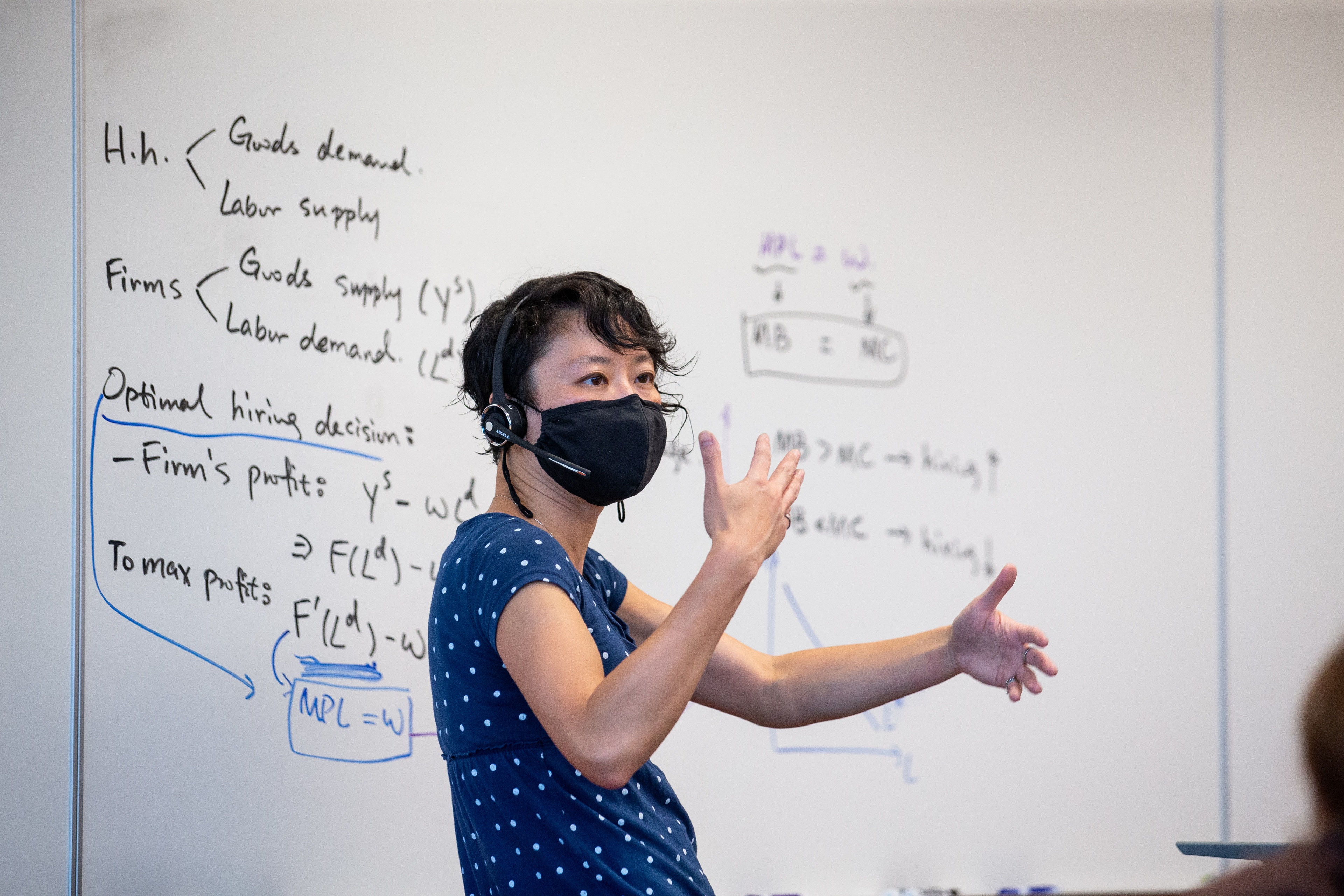
Vocal strain: How to protect your voice during the pandemic
BGSU communication and speech-language experts share ways to save your voice when wearing face coverings
Speaking for long periods of time while wearing a face covering can result in voice problems as people often increase their volume, especially while teaching or in groups.
Dr. Ron Scherer, Distinguished Research Professor in Bowling Green State University's Department of Communication Sciences and Disorders, and Donna Colcord, speech-language pathologist and clinic director of the BGSU Speech and Hearing Clinic, offer some suggestions regarding vocal health. These tips are useful at any time, but especially during this time of mask usage.
How do face coverings make it harder to communicate and impact good vocal health?
The use of face coverings decreases the visible cues of facial expressions and lip reading that we use to enhance our communication. This makes face-to-face communication more difficult and relies more on inference from the expression with the eyes.
The mask changes what people hear by reducing the loudness they hear and by filtering out parts of sounds, especially high frequency sounds that are so important to intelligibility of spoken language. If using a phone while wearing a mask, this problem is more severe because those higher important frequencies are filtering even more.
Additionally, masks are made of different fabrics and some are more resistant to airflow, making it harder to breath normally. This can lead to more fatigue.
Because of the airflow resistance of the mask, the reduction in loudness and the distortion of the sounds people hear, individuals speak louder with greater effort, which leads to vocal fatigue and increased communication frustration.
How does physical distancing make it harder to communicate and impact good vocal health?
To compensate for distance, individuals automatically speak louder. The further distance between communication partners causes a significant decrease in the loudness of the message to be heard. Once again, the typical compensation is to speak louder, using greater effort, that can cause vocal fatigue and increased communication frustration.
Is it different for individuals who speak in professional settings vs. individuals who are doing regular activities wearing masks and/or social distancing?
Individuals who speak professionally have an increased need for clarity and intelligibility of their messages to reach their communication partner. They often are dealing with decisions that impact care of patients, care of customers, etc., that require increased intelligibility all day long with few windows of vocal rest.
Social or nonprofessional communication tends to have increased periods of listening and speaking and can provide time to "rest the speaking voice." However, use of masks does impact the intelligibility as previously described.
What are some of the symptoms that people should be aware of?
Vocal fatigue: Your voice is tired, it is difficult to speak for long periods of time, muscles around the throat may feel tight, and you might have general body fatigue.
The other symptom to watch is change in the quality of your voice. You might hear hoarseness, breathiness, cracking and pitch breaks.
Why is hydration an important part of good vocal health?
Hydration and good nutrition are important for overall health with increased needs as activity increases. The vocal folds need to have good surface lubrication to maintain healthy vocal fold vibration. Externally, dry and cold air, breathing with an open mouth posture and certain medications can cause dehydration of tissues. Internally, certain medications, caffeine and sweating without replacing the fluids cause tissue dehydration. It is important to take in approximately 60-80 (or more) ounces of water per day to stay hydrated.
What are the top 5 tips for everyone who wears masks to communicate with one another?
- Speak with clear speech: Use increased articulatory precision; pause between thoughts; use a comfortable rate of speaking.
- Use an amplification system for teaching class or when in large groups.
- Maintain social distance but make sure you are facing the person with whom you are speaking (so the sound is directed toward the listener).
- Increase your use of body language: facial expressions, hand and body gestures and movements
- Don't hesitate to ask for repeated or clarification of information.
Any additional tips to share?
If you are vocally fatigued at the end of the day, rest the voice as much as possible and try to decrease the amount of speaking you do during the day. If the sound of your voice changes and is more rough or hoarse for more than one week, see an Ear Nose and Throat (ENT) doctor to check the health of your vocal folds.
For additional tips, visit the BGSU Speech and Hearing Clinic with any voice concerns, as well as any communication difficulties, at 419-372-2515.
Media Contact | Michael Bratton | mbratto@bgsu.edu | 419-372-6349
Updated: 12/02/2020 03:58PM
